June 22, 2025 | 11:44 GMT +7
June 22, 2025 | 11:44 GMT +7
Hotline: 0913.378.918
June 22, 2025 | 11:44 GMT +7
Hotline: 0913.378.918
Attending the event were Deputy Minister of Agriculture and Environment Phung Duc Tien and Secretary of the Khanh Hoa Provincial Party Committee Nghiem Xuan Thanh.
Mr. Nguyen Duy Quang, Director of the Khanh Hoa Department of Agriculture and Environment, stated that on January 28, 2022, the Politburo issued Resolution No. 09-NQ/TW on the construction and development of Khanh Hoa until 2030, with a vision to 2045. The resolution emphasizes strong development of the marine economy, focusing on aquaculture, fishing, and seafood processing, especially high-tech and environmentally friendly marine farming.
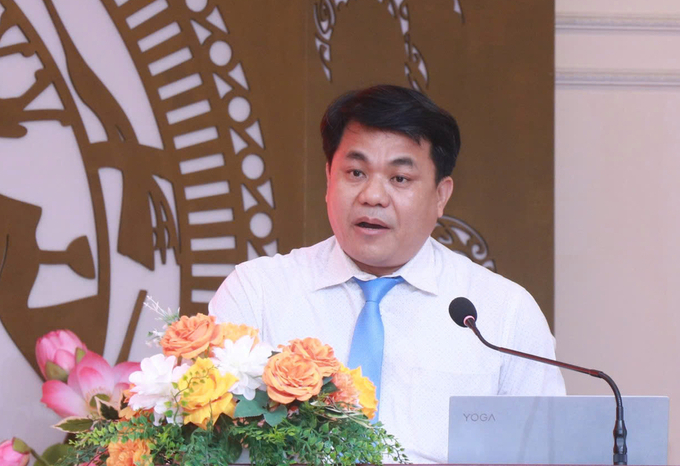
Mr. Nguyen Duy Quang, Director of the Khanh Hoa Department of Agriculture and Environment, speaks at the launch ceremony. Photo: KS.
To implement Resolution No. 09 of the Politburo and Resolution No. 42 of the Government, with funding from the Thien Tâm Foundation (Vingroup), in July 2022, the Khanh Hoa Department of Agriculture and Rural Development (now the Department of Agriculture and Environment) collaborated with the Institute of Aquaculture Research III to develop a pilot project for high-tech marine farming in Khanh Hoa. This project was approved by the Prime Minister under Decision No. 231 on January 24, 2025.
Prior to this, in order to concretize the pilot project, following the Prime Minister's approval and with the consensus of the Provincial People's Committee, the Khanh Hoa Department of Agriculture and Rural Development assigned the Provincial Agricultural Extension Center to collaborate with the Thien Tam Foundation in working with coastal localities in Cam Ranh City to establish a high-tech marine farming pilot model in open waters.
As a result, the pilot project selected 10 farming households that met all the necessary criteria and conditions for participation. The project provided support for 16 round HDPE cages (800m³ per cage) for marine fish farming and 12 square HDPE cages (24m³ per compartment, two-tiered) for lobster farming. Notably, these cages were equipped with surveillance cameras and marine positioning systems, allowing for 24/7 remote monitoring via electronic devices.
After one year of implementation, the HDPE cages in the pilot model yielded significantly higher profits compared to traditional wooden cages. Specifically, the cobia farming model achieved an average profit margin of 172%, the lobster farming model reached 112%, and the grouper farming model exceeded 131%.
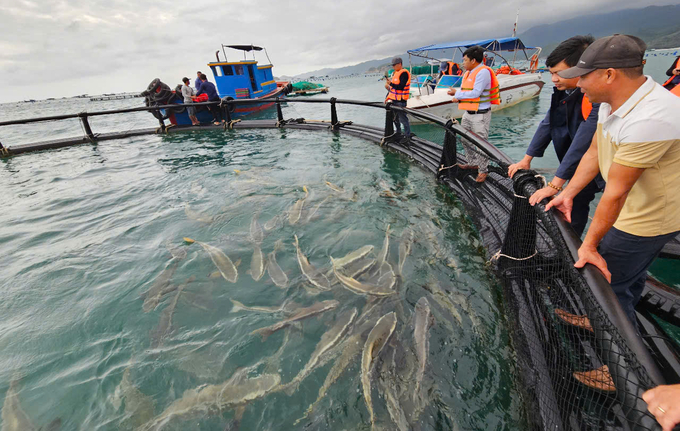
The pilot high-tech marine farming in the open waters of Cam Lap, Cam Ranh City, has proven to be highly effective. Photo: KS.
Mr. Vu Khac Muoi, an aquaculture farmer in Nha Trang City, shared that while aquaculture provides a livelihood for local people, it faces numerous challenges. Nearshore farming leads to environmental pollution, traditional wooden cages are easily damaged by storms, and small-scale farming results in lower product quality.
After participating in the pilot high-tech marine farming model in Cam Lap Commune, he observed significant improvements. The HDPE cages proved resilient to natural disasters, and the quality of the farmed products was much higher. Encouraged by these results, he is now also taking part in the pilot high-tech marine farming project in the Dam Bay area.
According to Mr. Nguyen Duy Quang, Director of the Khanh Hoa Department of Agriculture and Environment, the project designates 1,443 hectares for high-tech marine farming within 3 nautical miles and approximately 1,273 hectares between 3 and 6 nautical miles.
At the announcement and launch ceremony, Mr. Dinh Van Thieu, Vice Chairman of the Khanh Hoa Provincial People's Committee, assigned the Department of Agriculture and Environment to take the lead, in coordination with relevant units, in promptly advising the Provincial People's Committee on issuing criteria and classification standards for fish cages at different levels of technology and quality. These standards will be tailored to specific farming areas, scales, and storm resistance levels for implementation across the province.
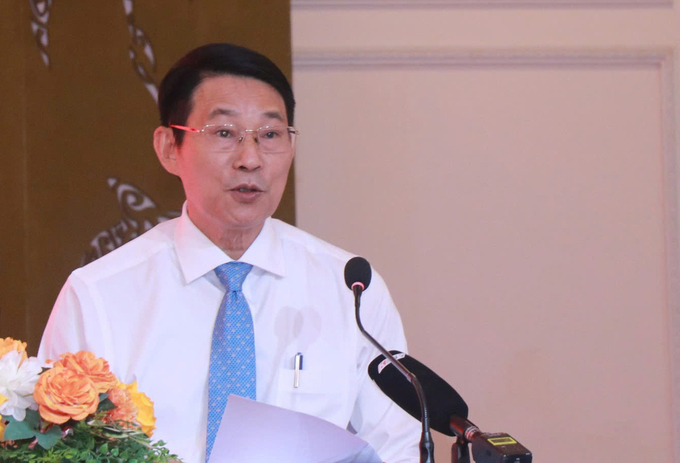
Mr. Dinh Van Thieu, Vice Chairman of the Khanh Hoa Provincial People's Committee, speaks at the ceremony. Photo: KS.
At the same time, the province will propose that the Provincial People's Council issue policies to support funding for disaster risk insurance for marine aquaculture species and accident insurance for workers operating on fish cages and vessels serving marine aquaculture activities. Additionally, financial support will be provided for the transition from traditional-material fish cages to those made from modern materials.
Furthermore, production will be reorganized along the value chain, covering everything from seed production, input materials, and cage construction to commercial farming, processing, and product distribution. Enterprises involved in purchasing, processing, and marketing will serve as the core link in structuring the production chain. Measures will also be implemented to protect the environment and marine ecosystems. Investments will be made in infrastructure for concentrated marine aquaculture zones, including buoy systems, boundary marker lights, and mooring systems for fish cages.
The Department of Finance, the Department of Industry and Trade, and the Van Phong Economic Zone Management Board are assigned to lead efforts in attracting enterprises and economic groups to invest comprehensively in the development of marine farming. Priority will be given to organizational models that promote linkages and joint ventures across various stages, including seed nursery, production, feed supply, commercial farming, and product distribution.
The Department of Science and Technology will facilitate connections and commission research from institutes, universities, scientists, experts, businesses, and relevant organizations to develop and implement tasks supporting high-tech marine farming.
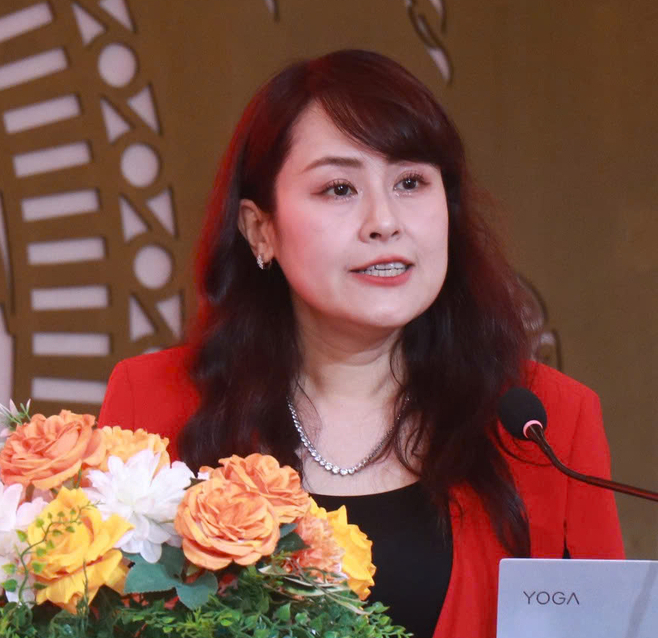
Ms. Nguyen Linh Chi, a representative of the Thien Tam Foundation (Vingroup), stated that the foundation will continue to support the development of high-tech marine farming in Khanh Hoa Province. Photo: DT.
The People's Committees of coastal districts, towns, and cities will reorganize aquaculture zones, specifically designate locations, and allocate marine farming areas to residents, cooperatives, and marine farming associations.
The Provincial Cooperative Alliance will restructure small and scattered farming facilities under a community-based management model.
Aquatic seed production enterprises are encouraged to proactively research and apply technology in breeding to ensure high-quality seed production and nursery operations, as well as feed supply for commercial aquaculture. Meanwhile, individual farmers and aquaculture households in the province are encouraged to invest in new material cages and supporting technologies to enhance productivity and marine farming output.
Ms. Nguyen Linh Chi, a representative of the Thien Tam Foundation (Vingroup), stated that in the coming period, the foundation will continue working with the Khanh Hoa Provincial People's Committee to support farmers in transitioning from traditional farming methods to HDPE cages. This transition will enable farmers to move to offshore waters with better water quality.
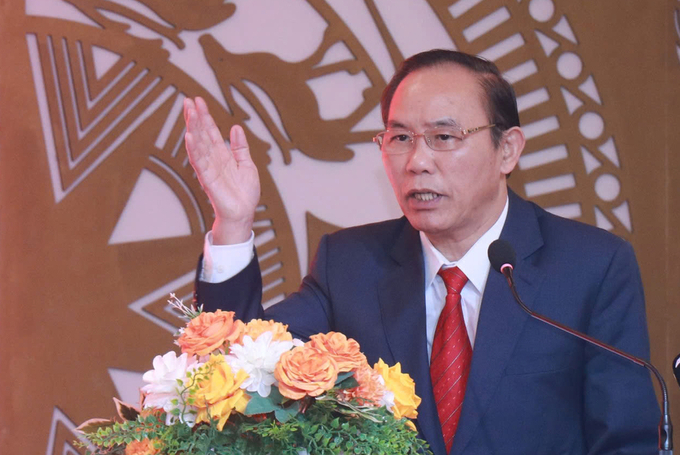
Deputy Minister of Agriculture and Environment Phung Duc Tien speaks at the launch ceremony. Photo: KS.
At the ceremony, Deputy Minister Phung Duc Tien highly praised Khánh Hòa for being the first province to announce a pilot project for high-tech marine farming. To ensure the project develops in-depth and effectively, serving as a foundation for expanding the marine farming industry to other coastal localities, the Deputy Minister urged Khanh Hoa to focus on improving policy mechanisms, training high-quality human resources, and investing in science and technology, broodstock, feed, and effective disease prevention.
Additionally, he emphasized the need to develop supporting industries, invest in infrastructure, and organize production along the value chain to build a strong brand for high-value aquaculture products.
According to Ms. Nguyen Linh Chi, a representative of the Thien Tam Foundation, for the Hon Noi area, the foundation will explore support for marine farming infrastructure, as well as provide two large vessels to transport residents to the farming areas. Additionally, it will develop a detailed zoning plan to ensure efficiency, aesthetics, and environmental protection.
The foundation will also collaborate with the People's Committee of Cam Ranh City to design and propose the construction of a public ferry terminal at the southern end of Bai Dai, helping residents shorten the travel distance from the mainland to the farming areas. At the same time, it will continue updating scientific and technological applications, researching AI models, marine farms, and infrastructure for the farming zones.
Translated by Kieu Chi
![Turning wind and rain into action: [9] Digitizing hydrometeorological data in response to climate change](https://t.ex-cdn.com/nongnghiepmoitruong.vn/608w/files/news/2025/06/17/z6704423696987_15fd32ffc26d590d204d520c9dac6786-nongnghiep-165943.jpg)
(VAN) Farmers have begun accessing hydrometeorological applications to adjust their cropping schedules, aiming to ensure productivity and adapt to climate change.
![Turning wind and rain into action: [8] Real-time salinity detection and early warning technology](https://t.ex-cdn.com/nongnghiepmoitruong.vn/608w/files/news/2025/06/17/z6704423696987_15fd32ffc26d590d204d520c9dac6786-nongnghiep-151127.jpg)
(VAN) Thanks to the integration of modern hydrological-hydraulic models, remote sensing technologies, and artificial intelligence, the accuracy of hydrological forecasting has significantly improved.
![Turning wind and rain into action: [7] Early disaster warnings help marine farmers minimize losses](https://t.ex-cdn.com/nongnghiepmoitruong.vn/608w/files/news/2025/06/17/z6704423696987_15fd32ffc26d590d204d520c9dac6786-nongnghiep-142942.jpg)
(VAN) In recent years, thanks to early disaster warnings and forecasting, marine farmers in Khanh Hoa province have been able to reduce risks and losses, thereby improving production efficiency.
![Turning wind and rain into action: [6] ‘Four on-the-spot’ disaster management software](https://t.ex-cdn.com/nongnghiepmoitruong.vn/608w/files/news/2025/06/17/e5a48259d6a262fc3bb3-nongnghiep-183800.jpg)
(VAN) By simply activating the scenario on the disaster management software, the relevant authorities immediately know how many households need to be evacuated, where to evacuate them to, and by what means of transportation…
![Turning wind and rain into action: [5] Hue applies modern technology in disaster forecasting](https://t.ex-cdn.com/nongnghiepmoitruong.vn/608w/files/news/2025/06/17/z6704423696987_15fd32ffc26d590d204d520c9dac6786-nongnghiep-093938.jpg)
(VAN) In Hue city, modern technology has recently been applied in meteorological and hydrological forecasting and warning, helping to reduce the damage caused by natural disasters.

(VAN) A cutting-edge farming technique being implemented on an experimental ranch in Arizona's Sonoran Desert has already saved a billion gallons of water over five years, according to Civil Eats.

(VAN) Poultry and pig production and the environment can be boosted through enhanced water technology, according to new research.